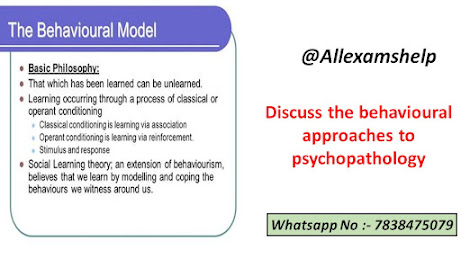Behavioral approaches to psychopathology refer to a group of therapeutic strategies and theories that focus on the modification of observable behaviors and environmental factors that maintain or contribute to psychological disorders. They are based on the idea that psychological problems arise from the learning of maladaptive behaviors and thoughts, and can be treated by changing these behaviors and thoughts through a range of therapeutic interventions.
Discuss the behavioural
approaches to psychopathology
Behavior
therapy: This approach uses classical and operant conditioning techniques to
modify problematic behaviors, such as exposure therapy for phobias, habituation
for anxiety disorders, and reinforcement procedures for substance abuse and depression.
Cognitive-behavioral
therapy (CBT): This is a widely used and evidence-based approach that
integrates both behavioral and cognitive perspectives. CBT focuses on the
thoughts and beliefs that individuals have about themselves and their experiences
and aims to modify maladaptive thoughts and behaviors.
Dialectical
behavior therapy (DBT): This is a type of CBT that was originally developed to
treat individuals with borderline personality disorder, but it has also been
used to treat other disorders such as depression and substance abuse. DBT
combines behavioral techniques with mindfulness and acceptance-based
strategies.
Applied
behavior analysis (ABA): This approach is based on the principles of operant
conditioning and is used to treat a range of disorders including autism,
developmental disabilities, and behavioral problems. ABA focuses on reinforcing
desired behaviors and reducing problematic behaviors through the manipulation
of consequences.
For SOLVED PDF & Handwritten
WhatsApp No :- 7838475019
Behavioral
approaches to psychopathology have been found to be effective in treating a
range of psychological disorders, particularly when used in conjunction with
medication and other therapies. They can also be useful in reducing symptoms,
improving functioning, and promoting lasting change.
Behavioral
approaches to the treatment of addiction focus on changing the behaviors,
thoughts, and environmental factors that contribute to substance abuse and
other forms of addictive behavior. These approaches are based on the idea that
addiction is a learned behavior that can be modified through therapeutic
intervention.
Cognitive-behavioral
therapy (CBT): This approach focuses on modifying the thoughts and beliefs that
individuals have about their substance use, as well as addressing the behaviors
that maintain their addiction. CBT has been found to be effective in the treatment
of a range of addictions, including alcohol and drug abuse.
Contingency
management (CM): This is a type of behavioral therapy that uses positive
reinforcement to encourage individuals to change their substance use behaviors.
This can involve rewarding individuals for positive behaviors, such as staying
abstinent, or punishing them for negative behaviors, such as substance use.
Motivational
interviewing (MI): This is a client-centered approach that aims to increase an
individual's motivation to change their substance use behaviors. MI focuses on
exploring the individual's ambivalence about change and helping them to see the
benefits of change for them selves.
Community
reinforcement approach (CRA): This is a comprehensive behavioral treatment that
involves not only working on changing substance use behaviors but also
addressing other areas of an individual's life that may be contributing to
their addiction. CRA involves using reinforcement procedures, such as vouchers
or tokens, to reward individuals for positive behaviors and activities.
Behavioral approaches to the treatment of addiction have been found to be effective in reducing substance use and promoting lasting recovery. They can also be used in conjunction with other treatments, such as medication and 12-step programs, to enhance their effectiveness. It is important to note that every individual is unique, and the most effective approach will vary from person to person.
